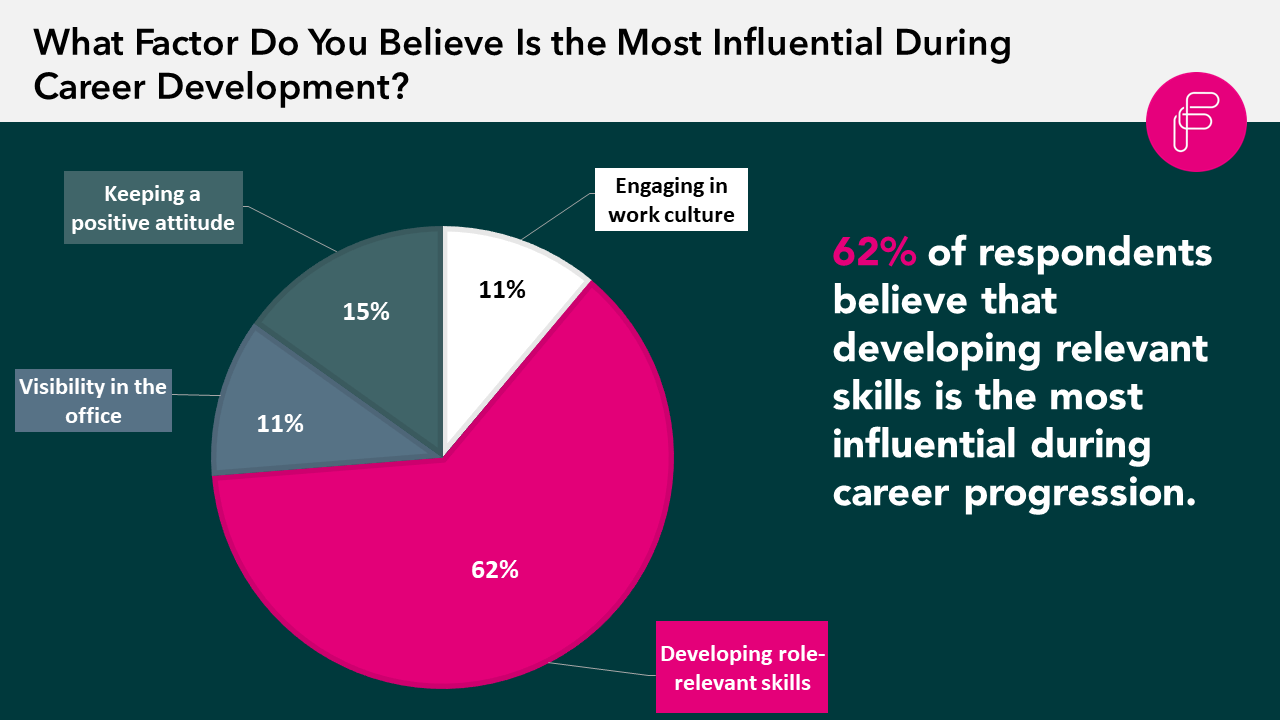According to research from PwC, 52% of CEOs worry about the gap between their workforce's existing skills and their ability to meet business needs.
This is where professional development steps in. It's not just about upskilling your team; it's about equipping them with the tools they need to excel, stay ahead of industry trends, and drive business growth.
In today's ever-changing business landscape, staying competitive is non-negotiable. Professional development isn't just a perk; it's a strategic investment in your company's future success.
Let's dive into five crucial considerations for effective professional development.
Why is professional development significant?
The world of work is changing.
Data reports show that younger generations are 120% more likely to job hop if they aren’t feeling supported in their role; new technologies, like generative AI, are creating huge pressure for workers to reskill, and flexible working arrangements mean some workers see the office less frequently.
These changes are just the tip of the iceberg. For organisations, recognising and managing these shifts is crucial if they want to develop effective professional development plans.
According to the World Economic Forum, at least a billion people will need to be reskilled over the next decade to deal with technological transformation.
But professional development isn't only an organisational concern. Individual workers are also eager to capitalise on learning opportunities to further their functional, technical and real-world knowledge.
In a survey conducted by Freshminds, we explored what employees thought was the most impactful way to develop their careers. A huge 62% of respondents believed that to be "developing role-relevant skills".

Providing these opportunities within your workplace could prove essential for employee retention and satisfaction - making professional development beneficial for both parties.
1) Professional development in the digital era
Above, we mentioned the impact of technological advances on the need to reskill, but how useful is the digital world as a tool for learning?
In the wake of the Covid-19 pandemic, we witnessed a rapid acceleration of existing trends, particularly in the realm of remote learning and skill development. This period saw a flurry of innovative approaches to education, including:
Online Learning Platforms: Notable platforms like PushFar and MentorLoop have come to the fore, offering a diverse array of courses and tutorials aimed at empowering professionals to enhance their skill sets at their convenience.
Remote Work and Collaboration Tools: Technological advancements have facilitated seamless remote work and collaboration, enabling professionals to engage effectively with colleagues regardless of geographical barriers.
Continuous Learning Opportunities: Digital resources such as podcasts, webinars, and online conferences have become increasingly prevalent, providing professionals with accessible avenues for enhancing their professional competencies.
Of course, the accessibility of online learning is a huge boon. It's also often more cost-effective and more flexible, meaning individuals can fit it into their schedule.
But is it always the best choice? While online learning is accessible, affordable, and flexible, it's worth noting that technical issues and the lack of face-to-face interaction can sometimes affect learning effectiveness.
It’s all about choosing what works best for you, your learning style, and your employees.
2) Inclusive learning
When thinking about building professional development plans, it's also useful to consider how inclusive the channels are.
Imperial University provides a statement which tackles this issue:
"Inclusive learning and teaching recognises all students' entitlement to a learning experience that respects diversity, enables participation, removes barriers and anticipates and considers a variety of learning needs and preferences."
Professional development should mirror this commitment, especially given the documented challenges faced by certain groups. For example, research indicates that women encounter difficulties accessing mentoring networks compared to their male counterparts.
Some might think this can be tackled by women-only programmes. However, this may risk reinforcing masculine domination in organisations by framing women as 'the problem' to be fixed through a formal initiative.
This problem may also exist if you organise learning through other intersections such as race, socio-economic background, and disability.
Organisations should be aware of this while building professional development and learning opportunities.
3) Coaching vs mentoring
Coaching and mentoring are important ways of improving job performance. They are distinct yet complementary approaches to personal and professional development.
Coaching: This is usually more focused on the development of specific skills and competencies for specific situations. For instance, a professional seeking to improve their leadership skills might hire a career coach to work on discrete areas such as effective communication or conflict resolution.
Other forms of coaching include:
Skills coaching
Performance coaching
Leadership/ Executive coaching
Mentoring: In contrast, mentoring is often a longer-term relationship emphasising holistic career and personal growth, facilitated by informal guidance from experienced mentors. Mentoring in the workplace can be formal or informal – relationships arranged as part of an organisationally sanctioned program, relationships that develop spontaneously or more. It may include:
Career-related support functions
Psychosocial support functions
Entrepreneurial mentoring
Both methods aim to support individuals, with coaching targeting specific challenges and mentoring addressing broader development needs.
Data from PayScale's 2019 Compensation Best Practices Report shows that 32% of those surveyed were most interested in “Management/ Leadership Training”, with a “professional certification” followed closely behind at 30%.
4) In-house or external
Another element to consider in training is whether you want to develop plans internally or, instead, rely on external providers.
In-house training, conducted internally within an organisation, can be incredibly useful, as it can be tailored to its specific needs, resources, and culture. It's often led by internal staff, and because of this, it often directly addresses company goals and procedures.
However, this could be a financial strain to a business, particularly a small one, and employees may see greater long-term value in learning from an objective educational board or organisation.
93% of organisations and workers face barriers to accessing the digital skills training they need to remain competitive.
External training involves utilising resources outside the organisation, such as workshops, seminars, or online courses provided by external vendors or institutions.
It offers diverse perspectives and expertise but may not be as customised to the organisation's unique requirements. Both types have their merits, with in-house training fostering internal cohesion and external training bringing fresh insights.
Both are valid options and in an ideal world, employees would have access to both in some capacity.
5) The language of trust
Of course, we know why professional learning is important, but the method of communication should be equally considered.
If mentors and coaches are being utilised for development, a positive relationship between the "teacher" and the "student" needs to exist. Trust, rapport, compassion, and shared vision can be important components of effective learning.
Often, this comes down to communication - ensuring shared expectations and commitments to the process and that both parties are happy with the arrangement.
Overall, trust is fundamental in professional development, creating a positive workplace culture where individuals thrive and achieve their full potential. When individuals trust each other, they freely share ideas, provide feedback, and work towards common goals, leading to enhanced productivity and morale.








